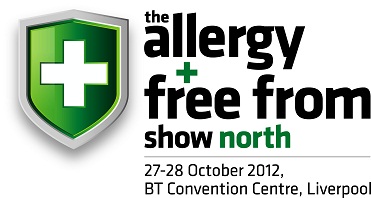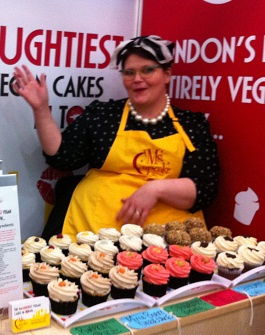
The Allergy Show is big business. Since I first attended back in 2008 when there were perhaps fifty stands at the most the show has grown fast and is now a huge, bustling and lively event, not to be missed by anyone living with allergies, whether themselves or a family member.
The London event this year was massive.
It was crazy.
It was so busy I had to keep escaping to the corner for a breather.
How do you tame a beast that gets so big?
How do you manage such an important event, where people can discover amazing new products, speak to experts and hear the latest thinking at the various talks and presentations?
Most importantly, how do you make sure it’s a safe place for visitors with so many different demands?
How do you make the most of the opportunity to educate staff working on stands, visitors and everyone involved how important vigilance, information and communication are when offering food products to people with allergies and sensitivities.
Having organised seminars, conferences and networking events, albeit on a much smaller scale, I know how much effort is required and how many little tasks go into making the whole event a success.
The Director of The Allergy Show, Tom Treverton, kindly agreed to answer all my burning questions. All those things I lay awake at night desparate to ask of the man who organises my favourite show in the Allergy year.
I may be exagerating but I always have so many questions and am a little bit nosey so Tom didn’t really know what he was letting himself in for.
Q.1) How did you get involved with planning the Allergy Show and what’s your role in the event management process?
I joined our company in January 2010, having been offered an Event Director role. My predominant focus was to manage the delivery of (what was then) The Allergy & Gluten Free Show, which we had recently purchased. It’s fair to say that the show was in a pretty different place back then, but we were (and remain) incredibly excited about the its potential and how important the show could be for so many people in the UK, should it be given renewed energy, enthusiasm and focus.
Put simply, my job is to manage the show’s team and deliver the event. In events, there are three key areas to get right: sales (selling sponsorship and exhibitor stands), marketing (show promotion) and operations (the physical delivery of the event). I work closely with colleagues that have specific roles within these areas to ensure they all come together to produce a great event.
Q.2) Where have you worked before and what attracted to this role?
My background is in the events industry. Following university, I spent six years working for a group of event-based trade associations, representing the organisers, venues and supplier companies that make the UK events industry a global leader. Via various roles within these associations, I received a great education on the events industry. My current role was a brilliant opportunity to work for a growing event organising company, full of talented people, and to be part of a tremendously exciting and ambitious project, The Allergy & Free From Show.
Q.3) Who originally set up the Allergy Show? How old is it and when was it first established?
The Allergy & Free From Show has undergone a few name changes in its relatively short history, but was first setup and launched by Jonathan Shaw of Palace Gate Communications. The first show ran in 2006. Palace Gate ran four editions of the event, prior to our purchase and inaugural edition in 2010.
Q.4) What is your main aim for the Allergy show?
To deliver people with allergies, intolerances and related conditions a fantastic day out, which both educates and entertains in equal measure. We know how incredibly difficult it can be for families to recognise symptoms, achieve credible diagnosis, seek the best treatments, then adapt their lives to minimise the impact those conditions can have. Our aim is to deliver those families a place where, whatever stage of the process they find themselves in, they can go to get expert advice, try and buy the latest relevant products, get reassurance, meet like-minded people and have a great time doing so!
Q.5) Do you, your family, or anyone on The Allergy Show team have any allergies?
I have hay fever. My wife and two year old daughter both have eczema. Within the organising team, we have colleagues with asthma, dust mite allergies, cat / dog allergies, nut allergies, IBS, eczema and suspected coeliac disease. Collectively, we do have first-hand experience of these conditions, which we consistently draw upon in our show planning.
Fundamentally, however, we are event experts; we know what it takes (and how hard you have to work) to deliver great events.
Though we have personal experiences to refer to, when we took on this event, we knew that this show would never realise its full potential without the support and guidance of the best possible health professional specialists, charities, associations and support groups. When I was hired as Event Director, my first priority was to get out there and gain the support of the real experts, the people and organisations best placed to guide this event in the finest possible direction. We dedicated significant time to this, we still do, and we will never stop seeking such guidance.
We work closely with fantastic health professionals like Dr Adam Fox (Consultant Paediatric Allergist), who acts as our Clinical Lead for CPD health professional content specifically, and brilliant charities like Allergy UK, Coeliac UK, The Anaphylaxis Campaign, Asthma UK, The IBS Network and National Eczema Society. There are countless others I can list, and their collective influence is integral to the way we develop the event.
Q.6) What measures have you put into place to make sure future shows are safer for those with allergies?
The safety of our visitors is (and always will be) our first priority. We are continuously working on new initiatives to ensure the show is as safe as it can be. Current initiatives include…
- Increasing the number of communications to our exhibitors pre-show, regarding the need for vigilance at all times regarding the transport, preparation and display of their products.
- Increasing the number of exhibitor communications regarding the need for all stand staff to be fully trained regarding the make-up / ingredients of all products and to ensure that thorough conversations regarding the specific health contexts of any visitor take place prior to any product sampling or purchasing.
- Introduce a code of conduct regarding exhibitor ‘best practise’ during to the event.
- Ensuring the exhibitor section of our website has more communications on these points.
- Increasing the number of onsite (at the show) communications to exhibitors regarding the need to maintain high standards at all times.
- More space (wider aisles) and seating; improved visitor comfort.
- Improving our communications to visitors on all the above points, via portals such as the website, show tickets, the show guide, and through onsite signage.
- Continuing to improve onsite medical facilities year-on-year, to coincide with increased visitor numbers.
- Consistently communicating that all visitors should speak to their GP / Doctor before altering their treatment of any health-related condition or before making a change to their lifestyle in anyway, as a direct result of any onsite interaction with any product, treatment or advisory source at the show.
When discussing safety at these shows, it’s important to understand precisely who they are for: thousands of people with an extremely diverse range of health conditions, both in terms of type and severity. They are inclusive. We do not run, for example, ‘The Free From Dairy Show’, we run ‘The Allergy & Free From Show’, meaning that we want a show that is relevant and accessible for people allergic to dairy, but that is equally applicable to those needing to avoid other allergens. Resultantly, they cannot be 100% free from any potential allergen. Furthermore, they take place in multi-purpose public venues, which host a different event every week of every year. These venues are as susceptible to any allergen as any other public place, and should be treated with precisely the same degree of caution by all visitors.
Safety at the show demands a comprehensive three-way street; it must be collaboration between us as organisers, the featured exhibitors and all show visitors. Everyone has a role to play. As organisers, we must source the best content and show participants, and do all we can to communicate, with total transparency, what the shows are and what they are not. Participating exhibitors must attend with a complete appreciation and understanding of the shows’ audience and prepare thoroughly, so they operate safely onsite. Show visitors must appreciate that no-one in the venue will know and understand their conditions better than themselves. Therefore visitors must liaise with the onsite products, treatments and advisory sources in a way that is entirely appropriate to their specific health conditions, or the specific health conditions of any person they are attending with. For example, if visitors always leave the house with certain medication, the day of the show should be no different. Visitors should also comprehensively discuss their personal context with an official member of any exhibiting team before trying any product or treatment onsite or post show.
Finally on this point, I must reiterate these are fantastic events with brilliant exhibitors and wonderful visitors. In the three years we have been running the show, safety standards across the board have improved and significantly contributed to the event’s dramatic growth. With safety, standards can always improve and this will remain our highest priority.
Q.7) What’s next for the Allergy Show?
Onwards and upwards! With any show we run, we aim to repeat and build on the last show’s success, remove (and learn from) the things that might not have worked and to embrace / introduce new ideas.
When we took on the London show, it was always our ambition to launch further editions in other regions. Right now, we are extremely excited about launching the second edition of the event, The Allergy & Free From Show North, at Liverpool’s BT Convention Centre on 27 – 28 October.
Liverpool is a welcoming, thriving city, with excellent transport links to the entire North West regions and North Wales. The BT Convention Centre is a fantastic venue in the heart of the city, with a great team who really wanted the event and are proving to be true partners in its delivery. Like London, the Liverpool show will be partnered by the most influential charities and experts in this space; in addition to great products, exhibitors will include Allergy UK, Coeliac UK, The Anaphylaxis Campaign, Asthma UK, The IBS Network and National Eczema Society.
In planning for Liverpool, we felt it was extremely important to ensure this North West-based show was strongly influenced by its host region. For example, we are working with the NHS’ North West Allergy Immunology Network to ensure that the best health professionals in the region are part of the show. The Network will have an exhibition stand at the event and its Consultant Allergists will deliver no less than three seminars (on paediatric and adult allergies) throughout the show’s two open days.
We hope to see as many people as possible in Liverpool this October, and cannot wait to get the show started.
Regarding future plans for both shows (and future regional editions!), our doors are always open to new ideas. Each new event is a blank canvass; there is always the opportunity to develop improved onsite content, features and visitor experiences. We already offer free from cooking classes, expert seminars, workshops, consultations and product demonstrations, but there’s always room to try new stuff (thoughts welcome, please send to Tom@f2fevents.co.uk).
On the social media side, we are seeing great results from our Twitter (@allergyshow) and Facebook presence (search ‘Allergy Show’), and we are really enjoying using these platforms to reach more people and engage new communities. Our ambition is for the show to be something people can interact with throughout the year, i.e. not just during the 5 collective days when the London and Liverpool show doors are open. We want to increase our online presence and do more to promote the event and its exhibiting family, as well as engage our visitors and offer improved information channels. I would suggest that the show is the ultimate ‘Tweetup’, though that’s not to say we couldn’t look at other opportunities! Equally, there are some brilliant bloggers out there and I would always be interested in discussing ways to work with them at the show.
Q.8) Do you know how far people travel to the show?
Though there are many examples where people travel great distances to be at the London show, the vast majority of that show’s audience are London and South-East centric. This means that London can continue to develop year-on-year and we can head to alternate regions (starting with Liverpool and the North West!) with confidence. Further regional editions are part of our plans, so watch this space.
Q.9) The show has seen quite amazing growth from the first time I attended and there were about 40 stands. What do you think this growth is down to and how are you keeping up with the changes in the industry?
The London show’s growth over the past three years has been phenomenal.
In 2010, our first year as organisers, the show achieved 8,126 visitors (approx. double the audience in 2009). In 2011, visitor numbers rose 30% to 10,588. In 2012, visitor numbers increased a further 30% to 13,721,
In 2010, we attracted 89 exhibiting companies to the show. In 2011, 117 exhibitors took part. In 2012, the show achieved record exhibitor numbers of 169. This represents a 90% increase in exhibiting numbers across two years.
This growth is down to a multitude of reasons, though two stand out for me…
1. Size of the issue
The rise in allergies, intolerances and related conditions is very real and very concerning. The show’ themes are relevant to millions of people in the UK. Over the past three years, there have been strong developments in the free from market, with many great products being launched and subsequently marketed at the show. In comparison to other nations, the provision of credible UK healthcare services falls way short of the demand in this area. The level of training and knowledge at primary care level, in particular, is simply not good enough. Consequently, people are getting frustrated and are looking take control of their situations and proactively seek solutions. The show provides a place where they can go to source credible advice from experts they might otherwise struggle to see, try and buy the best products and meet like-minded people that are going through similar experiences, all in one place at one time. Meeting health professionals and locating great products is fantastic, though I believe meeting people in a ‘similar or same boat’ is another brilliant (and often underrated) benefit of attending.
2. Hard work!
I work with an incredible team of people that love organising these shows and who care a great deal about the events and their visitors. Our team appreciate how important the show is, and understand how much more influential it could be. The last three years have not passed without error, we have made mistakes. However, for the most part, I believe we have done things the right way, from re-establishing the show’s credibility within clinical and charity circles, to immersing ourselves within the growing ‘free from’ product market, to conveying strong marketing messages and delivering highly effective promotional campaigns.
There’s loads more to do and we remain as enthusiastic as ever to progress the shows forward!
Q.10) How long does it take to organise each show? How early do you start planning?
We are always organising these shows! With events like these, there is always more you can do. Planning for the following year’s event starts the Monday morning after the show closes. In fact, onsite, at the show itself is one of the best places to plan the next edition, as you can monitor and review instantly whether ideas have worked or not and assess critical areas in need of improvement. In terms of promotion, our marketing campaigns tend to hit their stride in the three months leading up to a show, so I suppose this is when our work is most visible to the public. However, behind the scenes there is always work to be done!
Q.11) What do you do in the spare time, when you are not organising the Allergy show?
When not at work, most of my time is spent at home with my wife and two year old daughter. I’m a massive sports fan, football in particular. I’m also really into films and watch as many as I can; for me, it’s the perfect end to a day. Having said that, my wife and I are expecting our second child this month (due 22 August), so not really sure how much sport / films I’ll be watching in the coming months!
Q.12) When you tell people about your job, have their reactions changed? Do you think awareness is growing?
Awareness has undoubtedly grown over the past three years, however, I have never really had to work hard to explain the show concept to people. I don’t know anyone, nor remember speaking to anyone that doesn’t either have an allergy or intolerance, or knows someone that is living with an allergy or intolerance, so usually people get a firm understanding of what the show’s all about from its title alone.
Q.13) What’s your favourite allergy blog and why? <wink, wink=””></wink,>
There are some great blogs out there, yours included Ruth (no favourites)! These are wonderful in many respects; they are proactive, a great source for information and create strong and reassuring communities for people dealing with these conditions. As an organising team, we intend to do more blogging ourselves.
Q.14) What advice would you give to anyone thinking of going to The Allergy Show?
Come along and have a great time! Make sure you check the website (www.allergyshow.co.uk) to find out everything that’s going on at the show and select the day that’s going to benefit you most in terms of features like seminars, workshops and cooking classes. Check out which charities are offering 1-2-1 consultations with health professionals on their stands (some allow you to book time slots in advance). Get your ticket, tell your friends and enjoy the show.
Please enjoy the show, but do so in a safe and responsible way. Treat the show as if it was any other public outing and put your health first. If you regularly carry medication, bring it with you. Liaise with all exhibitors in a way that is appropriate to your condition; remember, no one understands your circumstances better than you!
Thank you Tom!
Tom, thanks for being such a sport and answering (nearly) all my questions. I hope to see you in Liverpool and I have lots of ideas for the show so no doubt we’ll be in touch.
Tom reads my blog (I know it’s his favourite really and I know he reads it because he’s commented before) so if you have a question for Tom why not post it as a comment. Anyone else going to Liverpool? If so let’s organise a what allergy coffee break. I’d love to meet some readers!












Leave a Reply